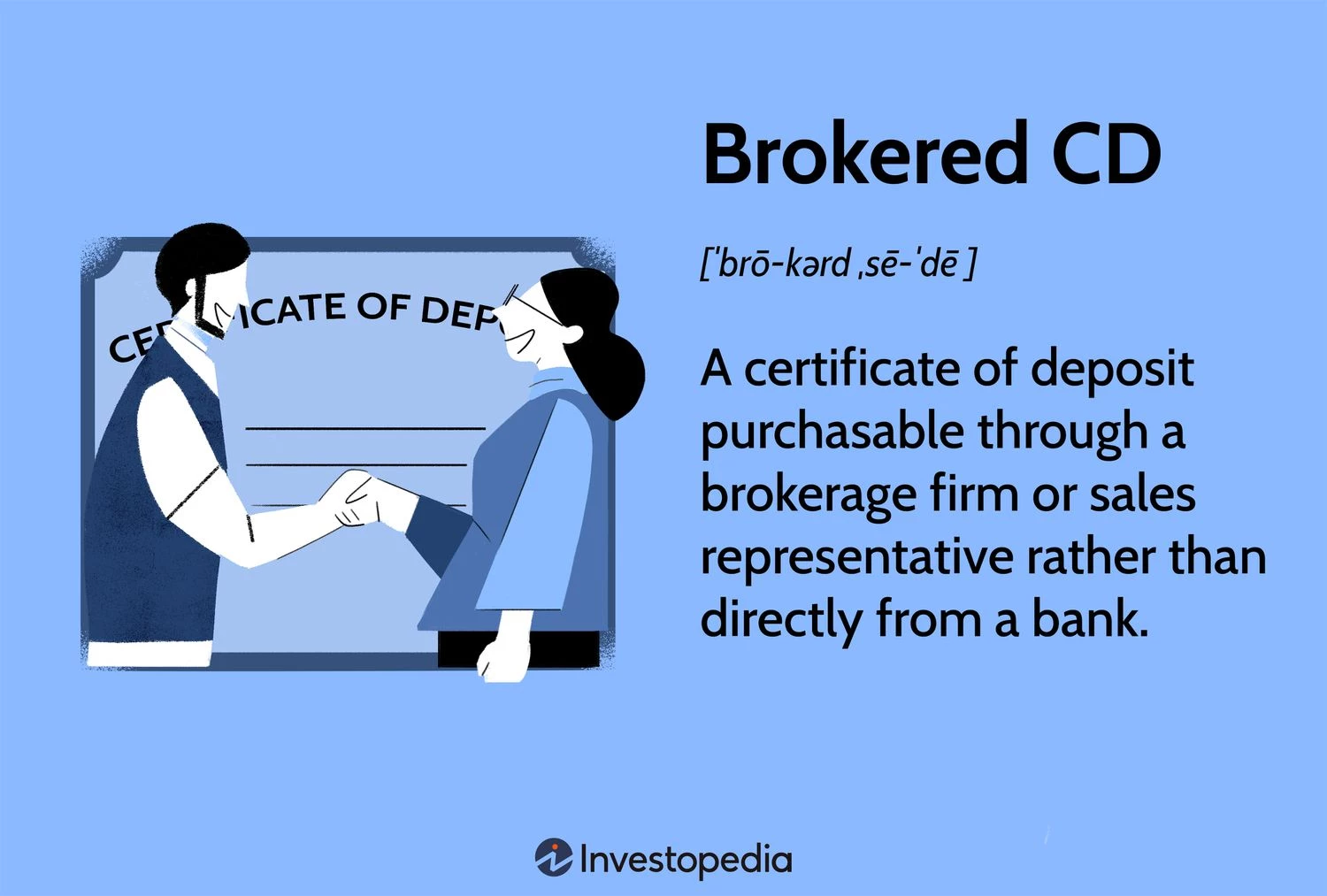Understanding Brokered Certificate of Deposit (CD)
When it comes to investing, a brokered certificate of deposit (CD) is a unique financial instrument. Rather than buying it directly from a bank, investors purchase a brokered CD through a brokerage firm or sales representative. Essentially, the bank still originates the CD, but it’s marketed by outside firms seeking to attract new investors. Brokers pool a large investment with a bank and then divide it into smaller portions, which are sold to various investors as brokered CDs.
Key Insights:
- A brokered CD is obtained through a brokerage firm or sales rep, not directly from a bank.
- While banks create brokered CDs, their sales are outsourced to attract potential investors.
- Brokered CDs are often more lucrative than regular CDs due to intense market competition.
- They offer greater flexibility compared to conventional bank CDs.
- However, this flexibility can lead to potential investment pitfalls.
Unpacking Brokered CDs
Brokered CDs typically yield higher returns than bank-issued CDs due to increased market competition. Brokers invest substantial amounts with banks, prompting higher interest earnings than individual investments. Similarly to traditional CDs, holders receive the full principal plus interest upon maturity.
Certificates of deposit (CDs) function as savings certificates, although they are more intricate than standard banking services such as checking or savings accounts. These financial instruments have fixed maturity dates and interest rates. CDs come in various denominations with minimum investment requirements and restrict access to funds before maturity without incurring penalties. Notably, brokered CDs can be traded on the secondary market unlike regular bank CDs.
While traditional CDs enjoy Federal Deposit Insurance Corporation (FDIC) insurance up to $250,000 per individual per bank, brokered CDs are not FDIC-insured directly. However, the underlying CD purchased by the broker from the bank is insured, emphasizing the importance of engaging with financially stable entities.
Wealthier investors often diversify their funds across brokered CDs from various banks, with each bank covered under the $250,000 FDIC insurance limit. This strategy provides a simple alternative to opening multiple bank accounts and can prove more lucrative than investing in U.S. Treasury bonds.
Benefits of Utilizing a Brokered CD
Brokered CDs offer enhanced flexibility compared to traditional bank-issued CDs. For instance, they may feature more extended terms, extending up to 20 to 30 years in some cases.
The secondary market for brokered CDs facilitates easier premature withdrawals, sans penalties, although a modest sales fee may apply. In falling interest rate scenarios, selling a brokered CD before its maturity could potentially yield profits.
Brokered CDs often boast higher yields than standard bank CDs, amplifying the attractiveness of these low-risk short-term investments.
Downsides of Brokered CDs
The flexibility of brokered CDs can present challenges for investors, particularly regarding interest rate risks. Long-term brokered CDs are susceptible to substantial price drops if sold on the secondary market amid rising interest rates.
Another risk arises when interest rates decline; callable brokered CDs may lead the issuer to refinance the CD at lower rates.
Investors must exercise caution as brokered CDs entail more risks compared to traditional bank CDs.
Some investors find the penalties associated with early CD withdrawals beneficial for restricting spending. Brokered CDs lack this discipline, as they can be freely traded on the secondary market.
Interest on brokered CDs doesn’t compound automatically like bank-issued CDs. Should you desire compounding interest, reinvesting earnings into another account is required.
Brokered CDs vs. Bull CDs
Unlike bull CDs, brokered CDs function independently of market indices. Bull CDs correlate interest rates directly to underlying market indexes, offering guaranteed minimum returns based on index gains. Investors benefit from incremental interest as market values rise.
Brokered CDs vs. Bear CDs
Conversely, bear CDs operate inversely to underlying market indexes. Interest rates climb only when market index values drop. Bear CDs are suitable for speculative and hedging purposes.
Utilizing bear CDs can help investors offset losses in a long position closely tied to underlying market indexes, thereby managing excess cash efficiently.
Brokered CDs vs. Yankee CDs
Similar to Yankee bonds, Yankee CDs are issued by foreign bank branches in the U.S. for American investors. Unlike brokered CDs, Yankee CDs aren’t marketed by secondary parties. They are U.S. dollar-denominated instruments tailored for foreign companies seeking capital from American investors.
Are Brokered CDs FDIC Insured?
Brokered CDs are not directly insured by the FDIC. However, the underlying CDs purchased by brokers from banks are insured. It is crucial to engage with financially sound entities when investing. CDs issued by banks are protected by the FDIC up to $250,000 per individual per bank.
Are Brokered CDs Superior to Bank CDs?
Whether brokered CDs are advantageous depends on your financial goals. These CDs often yield more than standard bank CDs. Additionally, they provide more flexibility, with longer terms, sometimes spanning up to 20-30 years.
Are Bank CDs Superior to Brokered CDs?
Investors must weigh the risks of owning long-term brokered CDs. These CDs can lose substantial value if interest rates rise before maturity and must be refinanced by the issuer in falling rate scenarios.
In Conclusion
Brokered CDs present intriguing opportunities for investors seeking alternatives to traditional CDs. Despite being originated by banks, brokered CDs are marketed through third-party firms, offering potentially higher returns and enhanced flexibility. It is essential, however, to understand the risks associated with brokered CDs, as their flexibility may lead to investment pitfalls. Read the terms carefully before investing to make informed decisions about your financial future.
